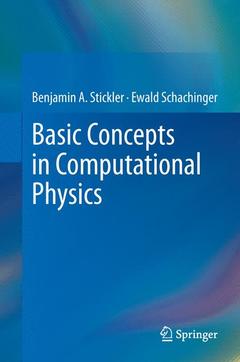Description
Basic Concepts in Computational Physics
Author: STICKLER Benjamin A.
Language: English
Subjects for Basic Concepts in Computational Physics:
Approximative price 47.46 €
In Print (Delivery period: 15 days).
Add to cartDescription
/li>Contents
/li>Comment
/li>
- Solution of complex mathematical problems such as, differential equations, minimization/optimization, or high-dimensional sums/integrals.
- Direct simulation of physical processes, as for instance, molecular dynamics or Monte-Carlo simulation of physical/chemical/technical processes.
Consequently, the book is divided into two main parts: Deterministic methods and stochastic methods. Based on concrete problems, the first part discusses numerical differentiation and integration, and the treatment of ordinary differential equations. This is augmented by notes on the numerics of partial differential equations. The second part discusses the generation of random numbers, summarizes the basics of stochastics which is then followed by the introduction of various Monte-Carlo (MC) methods. Specific emphasis is on MARKOV chain MC algorithms. All this is again augmented by numerous applications from physics. The final two chapters on Data Analysis and Stochastic Optimization share the two main topics as a common denominator. The book offers a number of appendices to provide the reader with more detailed information on various topics discussed in the main part. Nevertheless, the reader should be familiar with the most important concepts of statistics and probability theory albeit two appendices have been dedicated to provide a rudimentary discussion.
Part I. Deterministic Methods.- Numerical Differentiation.- Numerical Integration.- The KEPLER Problem.- Ordinary Differential Equations – Initial Value Problem.- The Double Pendulum.- Molecular Dynamics.- Numerics of Ordinary Differential Equations – Boundary Value Problems.- The One-Dimensional Heat Equation.- The One-Dimensional SCHRÖDINGER Equation.- Introduction to the Numerics of Partial Differential Equations.- Part II. Stochastic Methods.- Pseudo Random Number Generation.- Random Sampling Methods.- A Brief Introduction to Monte-Carlo Methods.- The ISING Model.- Some Basics of Stochastic Processes.- The Random Walk and Diffusion Theory.- MARKOV Chain Monte Carlo and the POTTS Model.- Data Analysis.- Stochastic Optimization.- Part III. Appendix.- Solving Non-Linear Equations. The NEWTON Method.- Numerical Solution of Systems of Linear Equations.- Basics of Probability Theory.- Phase Transitions.- Fractional Integrals and Derivatives in One Dimension,- Least Squares Fit.- Deterministic Optimization.- Index.
Deterministic methods are presented on a par with stochastic methods
Mathematically precise, but driven by the needs of physicists
Covers modern applications
Extensive appendices deepen the knowledge and present the mathematical basis




